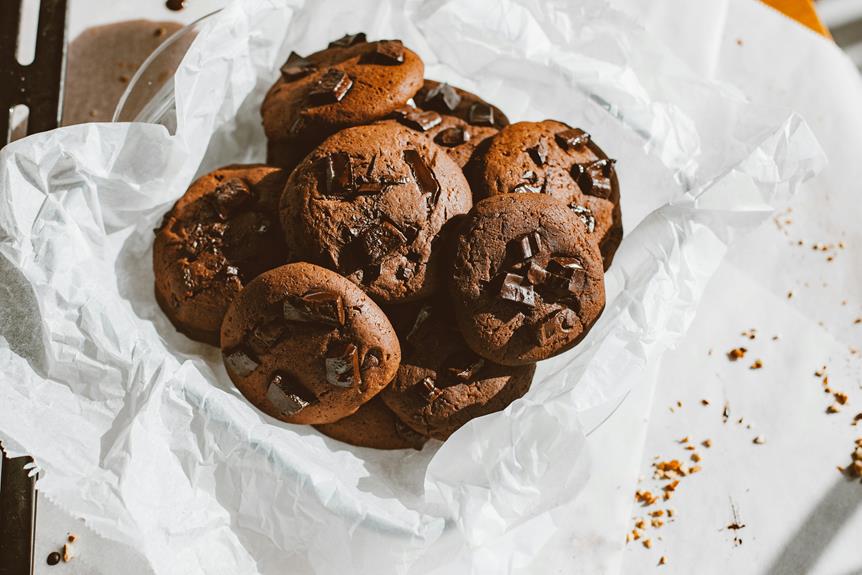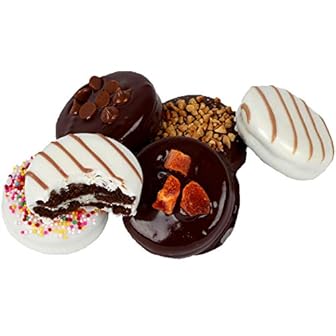
If you've ever craved that perfect soft and chewy cookie, you may wonder what makes some cookies so irresistibly delicious while others fall short. The key lies in a delicate balance of ingredients and techniques that can elevate your baking game to new heights. By uncovering the secrets behind achieving that coveted texture, you'll be one step closer to mastering the art of creating the ultimate cookie experience. So, what exactly are these secrets that can transform your cookies into delectable treats that keep everyone coming back for more?
Perfect Ingredient Ratios
For achieving soft and chewy cookies, focus on getting the perfect ingredient ratios right. Start by ensuring you have the right balance of flour, sugar, fat, and leavening agents. Too much flour can make your cookies dry and dense, while too little can cause them to spread too much. It's crucial to measure your ingredients accurately, especially the flour, as too much packed flour can result in tough cookies.
When it comes to sugar, a good balance is essential. Sugar not only adds sweetness but also helps with tenderness and moisture retention. Too much sugar can cause your cookies to spread excessively and become thin, while too little can result in dry, crumbly cookies. Finding the right amount of fat is also crucial. Butter adds flavor and richness, but too much can lead to greasy cookies.
Lastly, leavening agents like baking soda and baking powder play a vital role in cookie texture. Too much can cause cookies to rise too quickly and then collapse, resulting in a cakey texture. Experiment with different ingredient ratios to find the perfect balance for soft and chewy cookies.
The Importance of Resting Dough
Resting the dough before baking is a crucial step in achieving the perfect texture for your soft and chewy cookies. When you allow the cookie dough to rest, the ingredients have time to fully hydrate, resulting in a more uniform texture and better flavor development. This resting period also allows the flour to fully absorb the liquids in the dough, leading to a softer and chewier cookie.
During the resting process, the gluten in the flour relaxes, which helps prevent the cookies from becoming tough and dense. Additionally, resting the dough allows any pockets of air to escape, ensuring that the cookies bake evenly and have a consistent texture throughout.
To rest your cookie dough, simply cover it with plastic wrap or a kitchen towel and let it sit in the refrigerator for at least 30 minutes to a few hours. This step is especially important for recipes that contain a higher proportion of butter or sugar, as it gives the dough time to firm up and prevents the cookies from spreading too much during baking. So, next time you're making soft and chewy cookies, remember to give your dough the rest it deserves for the best results.
Baking Techniques for Texture
To achieve the desired texture in your cookies, mastering specific baking techniques is essential. The way you handle the dough can greatly impact the final result. Start by ensuring your ingredients are at room temperature. Cold ingredients can result in a denser cookie. When it comes to mixing, be careful not to overmix the dough. Overmixing can lead to tough cookies due to the development of too much gluten. Instead, mix until just combined to keep your cookies soft and chewy.
Another important technique is to properly measure your ingredients. Using too much flour can make your cookies dry and crumbly. Spoon and level your flour to avoid packing it in, which can lead to excess flour in your dough. Additionally, pay attention to the baking time and temperature. Overbaking can result in hard cookies, so remove them from the oven when they're just set and slightly underdone in the center.
Storage Tips for Freshness
To maintain the freshness of your soft and chewy cookies, store them properly in an airtight container at room temperature. By placing your cookies in an airtight container, you create a barrier that helps prevent moisture loss, keeping them soft and chewy for longer periods. Avoid using containers that are too big for the number of cookies you have, as extra space can lead to air circulation that may dry out your treats.
Furthermore, it's essential to keep your cookies away from direct sunlight or heat sources, as these can cause them to harden and lose their delightful texture. Additionally, refrain from storing different cookie types together, as they can exchange flavors when in close proximity.
If you need to stack your cookies in the container, place a sheet of parchment paper between each layer to prevent them from sticking together. Remember to enjoy your cookies within a few days for the best taste and texture. By following these storage tips, you can savor your soft and chewy cookies at their finest.





